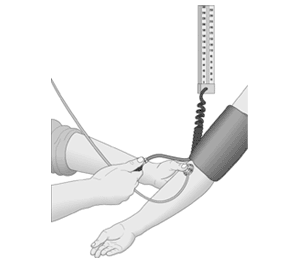|

What is blood pressure ? | What is high blood pressure ?
| What causes high blood presssure ?
How do you know if you have
high blood pressure ? | Why is
it important to control high blood pressure ?
How are high blood pressure and
kidney disease related ? | What
can you do about high blood pressure ?
Will I need to take medication ?

Blood pressure measures the force of your blood on the
walls of your arteries in two ways.
- Right after your heart beats
(systolic blood pressure)
- In between heartbeats
(diastolic blood pressure)
That
is why blood pressure readings are given as two numbers. For example, with
a blood pressure of
130/85 mm Hg, the systolic pressure is 130 and the
diastolic pressure is 85.
These two numbers show how hard your heart is working and the condition of
your blood vessels. The harder it is for the blood to flow through your
arteries, the higher the blood pressure will be.

High blood pressure is also called hypertension. It is
defined as blood pressure readings greater than 140/90 mm Hg*. The incidence of this
disease increases with age.
*The medical guidelines for what is considered "high blood
pressure" change from time to time. Please consult your doctor.

The causes of high blood pressure are not fully understood.
The risk factors which can lead to high blood pressure include:
·
Family history of high blood pressure
·
Obesity
·
Age-people over 50 years old have a greater chance of high blood
pressure, but it can occur at any age
·
Too much salt in the diet
·
Cigarette smoking
·
Too much alcohol (more than two standard drinks per day)
·
Lack of physical activity
·
Stress

High blood pressure is a silent disease. There are no clear
signs or warning signals. Usually, the only way you can tell if your blood
pressure is high is to have it checked by a healthcare professional. Blood
pressure readings can vary quite a lot so a single abnormal or high
reading does not always mean you have high blood pressure. If your first
blood pressure reading is more than 140/90 mm Hg, you should have it
checked on two more occasions to confirm that you have high blood
pressure. Of course, if your blood pressure is very high, your doctor may
start treatment right away.
You should have your blood pressure measured at least once a year.
BLOOD PRESSURE BEING TAKEN


Proper control of high blood pressure can prevent many of
its complications. If high blood pressure is not well-controlled, it can
lead to stroke, heart attack, heart failure, kidney failure (also called
chronic renal insufficiency), and damage to the blood vessels of the legs
leading to amputation.
If you have diabetes as well as high blood pressure, you must be
especially careful about good blood pressure control. For people with
kidney disease, good blood pressure control can slow down the decrease in
kidney function.

Some people who already have kidney disease can develop
high blood pressure. The opposite is also true: people with high blood
pressure can develop kidney disease. In fact, high blood pressure is the
cause of kidney failure in about 10% of new patients. High blood pressure
damages the blood vessels of the kidneys. This reduces the blood supply to
the kidneys so they are unable to remove fluids and waste products from
the blood. This can lead to kidney failure. When the kidneys fail,
dialysis treatment or a kidney transplant is needed.

At present there is no cure for high blood pressure.
However, it can be treated and controlled to reduce the chances of
developing problems.
If you have high blood pressure or wish to prevent it, you may have to
make some changes in your lifestyle including:
·
Eating healthy foods (low in fat and salt)
·
Quitting smoking
·
Keeping a healthy body weight
·
Getting regular exercise
·
Cutting down on alcohol
·
Learning to relax and take time to do the things you enjoy

You will need to take medication if your blood pressure is
very high or if lifestyle changes do not lower your blood pressure to
normal. In most cases, you will need to take medication for the rest of
your life. There are many types of blood pressure medication and, since
everyone's needs are different, your doctor will decide which medication
is best for you.
Controlling high blood pressure takes a team effort and you are the most
important person of the team. Be sure to see your doctor regularly. Do not
stop taking your blood pressure medication without talking to your doctor.
Mail us for more information and
details

|










